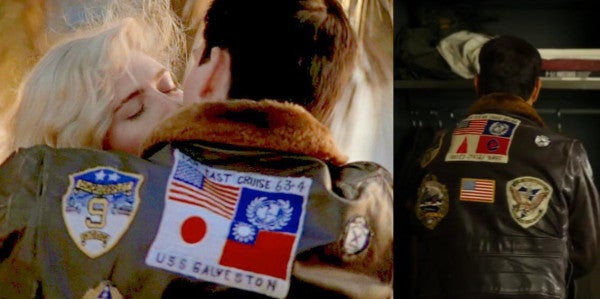‘Top Gun: Maverick’ apparently changed Tom Cruise’s jacket to please China’s Communist party
The sequel to Top Gun, a film that once boosted U.S. Navy aviation recruitment by 500%, appears to have bowed to China's powerful Communist party by changing the jacket of its titular character, Maverick, played by Tom Cruise

The sequel to Top Gun, a film that once boosted U.S. Navy aviation recruitment by 500%, appears to have bowed to China's powerful Communist party by changing the jacket of its titular character, Maverick, played by Tom Cruise.
In the trailer for Top Gun: Maverick, which came out on Thursday, Tom Cruise's character can be seen wearing his signature leather jacket, but something isn't the same anymore.
An eagle-eyed Twitter user pointed out that Maverick, whose entire character and name suggest a fierce independence, now wears a jacket that appears changed to appease China, the U.S.'s current chief military adversary.
There’s a new Top Gun movie coming out. And Maverick is wearing the same leather jacket – only this time it’s Communist Party of China-approved, so the Japanese and Taiwanese flag patches are gone (screenshot on right is from the new trailer)… pic.twitter.com/gUxFNFNUKX
— Mark MacKinnon (@markmackinnon) July 19, 2019
Maverick's old jacket had a large patch that read “Far East Cruise 63-4, USS Galveston,” commemorating a real-life U.S. battleship's tour of Japan, Taiwan, and the Western Pacific. Fittingly, the patch displayed the U.S., UN, Japanese, and Taiwanese flags.
In the new movie, the patch now has the U.S. and UN flags, but not the Japanese or Taiwanese flags, and makes no mention of the Galveston.
Now Maverick's patch has flags that look conspicuously like the Japanese and Taiwanese flags, but Business Insider could not identify them.
Business Insider reached out to Paramount Pictures for comment on the alteration and will update this story with any comments.
China frequently boycotts and retaliates against any organization that recognizes Taiwan or refers to it as a country. China threatened multiple airlines not to refer to Taiwan as a country, and they all buckled under the pressure. The U.S. responded, calling it “Orwellian nonsense.“
Japan occupied China during World War II and the countries still have bad blood from the brutal fighting seven decades ago. China frequently funds propaganda films featuring Chinese protagonists killing Japanese occupiers.
While the U.S. has left the question of Taiwan's independence open-ended, a recent defense paper referred to Taiwan as a country, prompting an angry response from Beijing.
The new film, a big-budget major-studio effort on a hot property, may have sought to maximize revenues by making the movie palatable to Chinese censors and audiences.
China heavily censors foreign films and television and is increasingly catered to by filmmakers as it's set to displace the U.S. as the top consumer of film.
Read more from Business Insider:
- Chinese companies are racing to build the best stealth fighters for China's next-generation aircraft carriers
- China's defense industry is exploding onto the scene as its top arms makers push past Western powerhouses
- Close analysis of Kim Jong Un's new nuclear missile submarine reveals it's bound for a suicide mission
- An internal investigation exposed cocaine use and lax testing within Navy SEAL Team 10
- 4 almost invisible threats that the U.S.'s highest ranking military-intelligence officer says keep him up at night